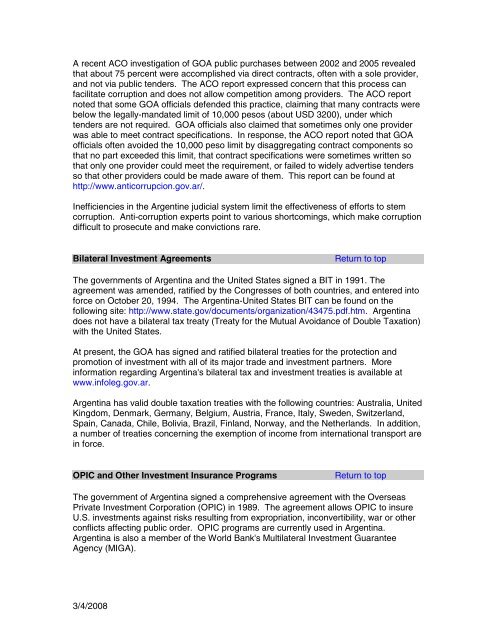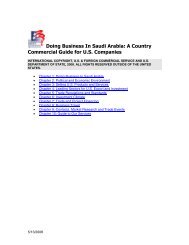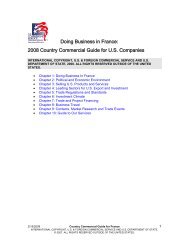Create successful ePaper yourself
Turn your PDF publications into a flip-book with our unique Google optimized e-Paper software.
A recent ACO investigation of GOA public purchases between 2002 and 2005 revealed<br />
that about 75 percent were accomplished via direct contracts, often with a sole provider,<br />
and not via public tenders. The ACO report expressed concern that this process can<br />
facilitate corruption and does not allow competition among providers. The ACO report<br />
noted that some GOA officials defended this practice, claiming that many contracts were<br />
below the legally-mandated limit of 10,000 pesos (about USD 3200), under which<br />
tenders are not required. GOA officials also claimed that sometimes only one provider<br />
was able to meet contract specifications. <strong>In</strong> response, the ACO report noted that GOA<br />
officials often avoided the 10,000 peso limit by disaggregating contract components so<br />
that no part exceeded this limit, that contract specifications were sometimes written so<br />
that only one provider could meet the requirement, or failed to widely advertise tenders<br />
so that other providers could be made aware of them. This report can be found at<br />
http://www.anticorrupcion.gov.ar/.<br />
<strong>In</strong>efficiencies in the Argentine judicial system limit the effectiveness of efforts to stem<br />
corruption. Anti-corruption experts point to various shortcomings, which make corruption<br />
difficult to prosecute and make convictions rare.<br />
Bilateral <strong>In</strong>vestment Agreements Return to top<br />
The governments of <strong>Argentina</strong> and the United States signed a BIT in 1991. The<br />
agreement was amended, ratified by the Congresses of both countries, and entered into<br />
force on October 20, 1994. The <strong>Argentina</strong>-United States BIT can be found on the<br />
following site: http://www.state.gov/documents/organization/43475.pdf.htm. <strong>Argentina</strong><br />
does not have a bilateral tax treaty (Treaty for the Mutual Avoidance of Double Taxation)<br />
with the United States.<br />
At present, the GOA has signed and ratified bilateral treaties for the protection and<br />
promotion of investment with all of its major trade and investment partners. More<br />
information regarding <strong>Argentina</strong>'s bilateral tax and investment treaties is available at<br />
www.infoleg.gov.ar.<br />
<strong>Argentina</strong> has valid double taxation treaties with the following countries: Australia, United<br />
Kingdom, Denmark, Germany, Belgium, Austria, France, Italy, Sweden, Switzerland,<br />
Spain, Canada, Chile, Bolivia, Brazil, Finland, Norway, and the Netherlands. <strong>In</strong> addition,<br />
a number of treaties concerning the exemption of income from international transport are<br />
in force.<br />
OPIC and Other <strong>In</strong>vestment <strong>In</strong>surance Programs Return to top<br />
The government of <strong>Argentina</strong> signed a comprehensive agreement with the Overseas<br />
Private <strong>In</strong>vestment Corporation (OPIC) in 1989. The agreement allows OPIC to insure<br />
U.S. investments against risks resulting from expropriation, inconvertibility, war or other<br />
conflicts affecting public order. OPIC programs are currently used in <strong>Argentina</strong>.<br />
<strong>Argentina</strong> is also a member of the World Bank's Multilateral <strong>In</strong>vestment Guarantee<br />
Agency (MIGA).<br />
3/4/2008












